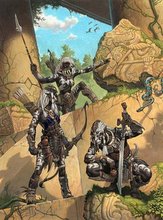Well yesterday I had so much to say and so much on my mind today I don't have so much... Passion. Instead I'm just chill. So I worked and had a pleasant day there, Trumph and I went to CC Seattle's and had a beer after work that was cool and now I'm blogging.
So let us continue in the education of all things African today shall we mes zamis? Today's topic, conservation in Africa. All agree that is important. Africa has animals found nowhere else on the globe that are as important to us in the African Diaspora as are our ethnic African Origins. And why not? Zebras, Elands, Mountain Gorillas, Dukier, Giraffes, lions, etc. are part of our natural heritage. These creatures fed our ancestors, gave rise to man of their legends and folklore, and defined the world in which they lived for good and ill.
Today I'm going to speak a little of the ill. As you know Chimpanzees are found only in Africa and they are a very threatened species. These apes share 99% of our DNA and they can be like us capable of kindness, warmth, cuteness, and fun. Also like us they can be full of brutality. They have wars of extermination, they practice infanticide, they murder each other etc. An animal so closely linked to people in so many startling ways that our ancestors have known and been close too is one that should be treasured no doubt. But what happens when that animal comes into conflict with humans? And furthermore what happens when that conflict is partly our fault as humans. Read this for me mes zamis and then we can continue:
From the front door of Anet Alikiriza's mud-walled house, you can watch the village children come and go as they fill old tins at the pump near the water's edge. Fields of corn, millet and cassava form a quilt of dusty browns and vibrant greens, and on a clear day, when a good rain has swept away the haze, the snow-capped peaks of the Rwenzori Mountains are visible in the distance. "After the attack we didn't go back to the old fields," Anet said, staring at the ground. "We just left the food there and started to plant banana here by the house. It is safer here."
Fear in the fields
On 22 November 2000, Anet and her mother were heading home having harvested potatoes on their parcel of farmland some distance from the house. Anet was carrying her three-month-old son on her front and a bundle of potatoes on her back. It was Anet's mother who saw the chimp first. The animal was approaching quickly down the trail, its hair bristling. Her mother yelled to Anet, who immediately screamed and turned to run.
"The chimp ran much faster than I could," Anet said. "It grabbed my leg, and I fell hard. Then it took my baby." The chimp dragged the child down the trail and into the bush. By the time a man arrived to scare the animal away with a spear, Anet's baby had suffered horrific injuries, and died in hospital a week later. Anet and her mother abandoned the fields near the lake in fear of another attack and later sold the land to pay for the large debts incurred from their trip to the hospital.
Primate vs primate
In the past seven years, there have been at least 15 attacks on young children by chimps in western Uganda. More than half proved fatal for the victims. Many survivors came away with brutal wounds, including lost limbs and fingers. During the first wave of attacks, near Kibale National Park, much of the blame was levelled on one chimp, nicknamed Saddam. Saddam became increasingly bold in his attacks over a two-year period, even snatching children from inside their homes. As the toll mounted, so did the tension between local communities and conservation officials. Saddam was eventually hunted down and stabbed to death by an angry mob of villagers shortly after he killed his third victim.
But the attacks continued. The most recent 'killer' chimp in the area, Kiki, has killed one child and maimed two others. Local people have become increasingly vigilant, abandoning remote fields near forest patches and never leaving young children unattended. While the rate of reported injuries and deaths has certainly decreased, chimps charge children or eat a family's goat at least once a month.
These troubles with chimps are a new issue for local people. Prior to the late 1990s, only six attacks on humans had been reported in East Africa since the 1960s. So why now and why in Uganda? I went in search of Kiki in the hope of finding an answer.
Kateeba Deo, a local farmer, artist and chimpanzee tracker, has spent most of his time searching for the 'killer' chimps Saddam and, more recently, Kiki. Near a small cluster of houses known as Nutuli, there is a tea estate and a tiny patch of forest covering not much more than an acre. A group of adolescent boys led Deo and me to their fields, where they no longer work for fear of Kiki. Remnants of chimp meals were abundant in the family's overgrown fields at the forest's edge - banana stems smashed and piths eaten, sugar cane stalks broken and corn husks stolen.
No go area
The boys' father complained bitterly about the chimp and its intrusion on their lives. The trouble had started eight months before, when the clearing of the forest for the tea estate got into full swing. "It has not killed anyone here," he explained, " but it chases people and eats our crops. My wife and our sons, they can't go to the field. We need that field for food, but we will have to let it go."
Deo and I were examining chimp tracks at the edge of a small banana farm, when one of the boys called out. Kiki was moving swiftly up a trail just a hundred metres away. As he hit the top, Kiki came face-to-face with a woman, who screamed and stumbled backwards. Kiki paused and advanced cautiously. When two more people came yelling down the track behind the woman, Kiki turned and fled.
Population boom
On our way out of Nutuli, we paused to look at the huge tea estate spread out before us in waves of denuded hills. When Deo was a young boy 20 years ago, the whole area was forested, and monkeys could be heard calling daily. But the population of western Uganda is currently growing at 7 per cent a year - two and a half times the national average - and supports some of the highest densities of rural human settlements in all of Africa. The toll this population boom is taking on the forests is immense.
Kibale National Park and the few bits of forest outside its boundaries have become islands in a sea of agriculture. Squeezed into this diminishing forest resource, chimps are finding it increasingly difficult to locate ample food and have adapted accordingly, seeking out what food they can in the new human-dominated ecosystems. The food the chimps do find is often the crops and livestock of local villagers - if not the humans themselves.
When Jane Goodall first witnessed and wrote of chimps eating meat, our notion of these primates as passive herbivores changed completely. Chimps generally hunt in groups, and adult males do the vast majority of the killing. Usually, they kill and eat a wide variety of monkeys and other forest mammals, including small antelopes. But as the forests are cut down, prey disappears and chimps search for alternative sources of meat.
Richard Wrangham, the Harvard primatologist, believes the first attack in western Uganda may have started with a chimp hearing the cries of a human baby and interpreting it as the call of a duiker, which would have triggered the predatory response. "The result is that some chimps learn that babies are easy prey," he says.
Human snares injure chimps
But it's not just humans who suffer from this escalating conflict. Twig, a chimp in the Kibale Chimp Project's study group, has no right arm. When I first met him, I was impressed by his agility as he manoeuvred his way down a stout tree trunk, wrapping his one hand around the back of the tree and pressing the stump of his right arm on the opposite side of the trunk for balance. All told, 25 per cent of the chimps studied in Uganda have injuries inflicted by snares.
Snare injuries, crop-raiding and chimp attacks on children are all symptoms of a greater conservation challenge. As Andy Plumptre, the East African director of the Wildlife Conservation Society (WCS), puts it: "Human-wildlife conflict is quickly becoming the biggest issue for conservation today." WCS, along with the Jane Goodall Institute and the Uganda Wildlife Authority has developed a chimp action plan that it hopes will reduce the problem in the long term.
The battle for habitat
The plan focuses on raising awareness, linking national parks through corridors of protected land, removing snares from forests and adjoining fields and building buffers between people and chimps. "In areas where there is no forest left outside parks, building an inedible buffer of crops may be the only option left," says Plumptre.
In the long term, though, the battle for habitat between chimps and people will continue, and chimps will keep on losing ground, unless the overriding factors of human-population growth and intense rural poverty can be addressed.
Short term solutions
In the meantime, Arthur Mugisha, the executive director of the Uganda Wildlife Authority, points out that the need for short-term solutions should not be forgotten. "All the conservation programmes mean nothing if I lose my crops or my child," he says. "We need to look more into compensation. We need to give something back to local people who lose so much." Mugisha argues that we must protect chimps regardless of the cost, but local people should not pay the highest price. Twig and Anet would undoubtedly agree.
So what is to be done? I agree that conservation programmes need to be in place in Africa but what about compensation for people who are attacked? What about making sure that Humans stay out of places that animals need to be in? A complicated fact with perhaps no answer that you and I can come up with but never the less one that uch of Africa, Asia, and South America are having the deal with. At any rate you've learned more about Africa today I'm sure...
I dunno I never started off with this intention but I think it is so important to know of what faces Mama Afrika and her children, to know where we came from. I mean am I wrong in saying that many of us know ore about the Others and than we do of the People? I don' beleive I am. Well perhaps that is enough for today, I believe this weekend will be most fun and Mo Grand Met I'm so glad it is almost here. Be blessed everyone, give love to those who need it (even if they do not necessarily deserve it), and have fun...I'll be back on Monday to talk to ya''l some more of maybe even before that. PAIX!!!
My life, poetry, novel posts, videos, just Kyon on the web. Pictures too! Bienvenue entrez s'il vous plait!
Thursday, August 02, 2007
Subscribe to:
Post Comments (Atom)
Salut Mes Zamis Sak Passe!
Wassup Folkz this is me Kyon Saucier also known as Mr Kyon on A4A or Creole Elf on BGC.... Aww come on now like none of y'all are ever on those sites, yeah you are 'cause I've seen you... LOL!
Enter my world for a second... What? Huh? Well yes there are Black People in the NW and yes we have a vibrant culture up here. I mean naw Seattle aint Atlanta or NYC or DC or Chicago or any other city with a huge Black Population, but it's my home and there are few places as beautiful... Not too mention in all of the NW Seattle and Tacoma have the highest Black Population. So come on enter the world of Kyon....Yon Yon Yon.... Sigh. I was trying to make an echo sound. Now look I I know I got some typos and things so be patient with me folkz.... Cause I get excited when I write... Okay there is no excuse 'cept that it's my page I do what I want! *smile*
Enter my world for a second... What? Huh? Well yes there are Black People in the NW and yes we have a vibrant culture up here. I mean naw Seattle aint Atlanta or NYC or DC or Chicago or any other city with a huge Black Population, but it's my home and there are few places as beautiful... Not too mention in all of the NW Seattle and Tacoma have the highest Black Population. So come on enter the world of Kyon....Yon Yon Yon.... Sigh. I was trying to make an echo sound. Now look I I know I got some typos and things so be patient with me folkz.... Cause I get excited when I write... Okay there is no excuse 'cept that it's my page I do what I want! *smile*
C'EST MOI! IT'S ME!

Sak Passe? WAZZUUUUUPPPPP!
Bishop

Yeah when I was younger I could've been considered a geek. Always my eyes fixed upon a world none could see. Always seeking to escape from the mundane things of this life.

But a geek I think of as dreamer, someone one who delights in things outside of the ordinary.
Just Me Again

And why not? Dreams were not meant for the sleeping times

For the ordinary world need not be such a boring place. There's always more than enough room for the things that make one smile.
Wolf Rider

Bear Claw
Blood Elven Prince

Worlds within worlds
Drow Hunting Party

Dark Elven Elegance
Adieu mes zamis....

May the light of Elves shine upon you....I know it's corny but this is my page!



No comments:
Post a Comment